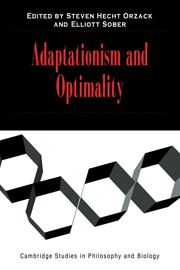Book contents
- Frontmatter
- Contents
- Contributors
- Acknowledgments
- Introduction
- 1 A Likelihood Framework for the Phylogenetic Analysis of Adaptation
- 2 Adaptation, Phylogenetic Inertia, and the Method of Controlled Comparisons
- 3 Optimality and Phylogeny: A Critique of Current Thought
- 4 Fit of Form and Function, Diversity of Life, and Procession of Life as an Evolutionary Game
- 5 Optimality and Evolutionary Stability under Short-Term and Long-Term Selection
- 6 Selective Regime and Fig Wasp Sex Ratios: Toward Sorting Rigor from Pseudo-Rigor in Tests of Adaptation
- 7 Is Optimality Over the Hill? The Fitness Landscapes of Idealized Organisms
- 8 Adaptation, Optimality, and the Meaning of Phenotypic Variation in Natural Populations
- 9 Adaptationism, Optimality Models, and Tests of Adaptive Scenarios
- 10 Adaptation and Development: On the Lack of Common Ground
- 11 Three Kinds of Adaptationism
- 12 Adaptation, Adaptationism, and Optimality
- Index
Introduction
Published online by Cambridge University Press: 06 January 2010
- Frontmatter
- Contents
- Contributors
- Acknowledgments
- Introduction
- 1 A Likelihood Framework for the Phylogenetic Analysis of Adaptation
- 2 Adaptation, Phylogenetic Inertia, and the Method of Controlled Comparisons
- 3 Optimality and Phylogeny: A Critique of Current Thought
- 4 Fit of Form and Function, Diversity of Life, and Procession of Life as an Evolutionary Game
- 5 Optimality and Evolutionary Stability under Short-Term and Long-Term Selection
- 6 Selective Regime and Fig Wasp Sex Ratios: Toward Sorting Rigor from Pseudo-Rigor in Tests of Adaptation
- 7 Is Optimality Over the Hill? The Fitness Landscapes of Idealized Organisms
- 8 Adaptation, Optimality, and the Meaning of Phenotypic Variation in Natural Populations
- 9 Adaptationism, Optimality Models, and Tests of Adaptive Scenarios
- 10 Adaptation and Development: On the Lack of Common Ground
- 11 Three Kinds of Adaptationism
- 12 Adaptation, Adaptationism, and Optimality
- Index
Summary
Scientific controversies have a bad reputation these days. Instead of being viewed as an engine of scientific progress, they are seen by many scientists and others as clashes of unresolvable ideological differences in the way the world is perceived and understood. One of us long ago, as a know-it-all Harvard graduate student in conversation with other such graduate students, often referred to this or that controversy as an example of the “dialectic of polarized fanatics,” with the absolute but unspoken know-it-all understanding that there was little, if anything, useful taking place. More meaningfully perhaps, controversies are often said to generate “more heat than light” on a given scientific issue and, to this extent, to do little to advance understanding. To some observers, the debate over adaptationism in evolutionary biology has this character. From this perspective, the various views about the power of natural selection to shape phenotypes are so different that proponents of each talk past each other and often do not even acknowledge the potential validity of alternative views. Of course, one can still view such steadfastness as essential for the progress of science instead of as indicating an unproductive narrow-mindedness. One need not think that the debate over adaptationism is unresolvable or agree with either view as to the nature of ideological differences to appreciate the importance of refining our understanding of the meaning of adaptation and of optimality models.
- Type
- Chapter
- Information
- Adaptationism and Optimality , pp. 1 - 23Publisher: Cambridge University PressPrint publication year: 2001
- 1
- Cited by

